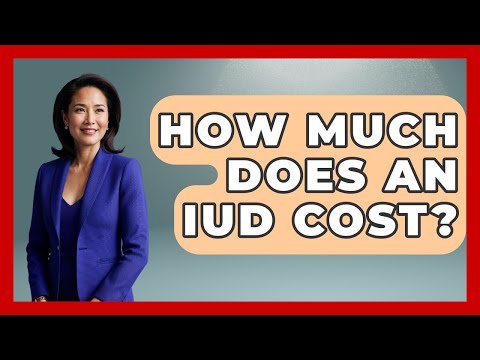
Hey there! So, let’s talk about something that can be kinda confusing but super important—birth control options. Ever heard of IUDs? They’re these tiny devices that go inside your uterus to help prevent pregnancy. Sounds simple, right? But the thing is, when it comes to IUD pricing and all the choices out there, it can feel like a maze.
You’re not alone if you find yourself scratching your head trying to figure it all out. Seriously, it’s like a puzzle sometimes! There are different types, costs vary, and insurance can complicate things. Ugh! But don’t worry; we’re gonna break it all down together.
Let’s dive in and make sense of those smart choices for you. Get ready!
Affordable IUD Options: A Comprehensive Guide to Cost-Effective Contraception
So, let’s chat about IUDs, right? They’re pretty popular for birth control, and understandably so. They’re convenient and can last for years. But, here’s the kicker—what about the cost? It can be overwhelming trying to figure out affordable options, but don’t worry! We’re breaking it down together.
First things first: an IUD (intrauterine device) is a tiny device inserted into the uterus to prevent pregnancy. There are two main types: hormonal and copper. The hormonal ones release hormones, while the copper ones use copper to hinder sperm from meeting the egg. Both have their pros and cons!
Now, let’s dive into cost:
- Upfront costs: The price of an IUD can range from $0 to $1,300. This includes the device itself plus insertion fees.
- Insurance coverage: Many insurance plans cover most of the costs associated with IUDs. Check with your provider to see what’s included.
- Sliding scale clinics: If you don’t have insurance or your plan doesn’t cover it all, clinics often use a sliding scale for payment based on income. This means you might pay less!
- Planned Parenthood: They offer affordable reproductive health services including IUDs. They’re great for understanding your options without breaking the bank.
- Payment plans: Some healthcare providers may offer payment plans or financing options to help manage costs over time.
I remember when my friend was debating getting an IUD—she was super stressed about the price tag! But when she called around to local clinics and talked to her insurance agent, she discovered that her plan covered it fully! It was such a relief for her; she ended up saving so much money!
The thing is, while cost is important, choosing what feels right for your body and lifestyle matters too! Always ask questions—don’t hesitate to get in touch with healthcare professionals if you’re unsure about anything.
This chat doesn’t replace real medical advice though; it’s just me sharing info! So make sure you consult someone qualified if you’re thinking about going down this path. Anyway, hope this helps you feel a bit more informed about affordable IUD options!
Understanding IUD Costs: What to Expect and Factors That Influence Pricing
You know, when it comes to IUDs, or intrauterine devices, people often wonder about the costs involved. And it’s totally fair to be curious! I mean, we’re talking about something that can stick with you for years. So let’s break it down.
First off, **the cost of an IUD can vary** quite a bit. Generally, you might be looking at anywhere from $0 to $1,300. Wow, right? But here’s the thing—this price largely depends on several factors.
- Insurance Coverage: If you have health insurance, many plans cover the full cost of IUDs. Some may even pay for the insertion procedure too!
- Type of IUD: There are different types, like hormonal ones and copper ones, and they might come with different price tags.
- Provider Fees: The healthcare provider you choose can also influence the cost. Some clinics charge more than others.
- Location: Where you live matters too! Prices can differ between urban and rural areas or different states.
Now let me tell you a little story. A friend of mine was deciding on getting an IUD after having her first baby. She was overwhelmed with all this info—like she had to shop around for prices! She ended up finding a clinic that offered sliding scale fees based on income. It was such a relief for her! So don’t hesitate to check around if one place feels too pricey.
Also, make sure to ask questions during your appointment! You have every right to understand what you’re paying for and why.
And remember: while this info gives you a glimpse into what to expect regarding costs for an IUD, it doesn’t replace chatting with a healthcare professional about your specific situation. They can give you tailored advice that fits your needs perfectly! So there ya go—understanding those costs isn’t as scary as it might seem at first!
The Cost of IUDs: Exploring the Most Expensive Options on the Market
You know, when it comes to birth control, one of the options that often pops up is the IUD. They’re super popular for a reason! But if you’ve ever looked into getting one, you probably noticed that there’s a wide range of prices. So let’s chat about the **cost of IUDs** and specifically look at some of the more expensive options out there.
First things first, what’s an IUD? Well, it stands for intrauterine device. It’s a tiny T-shaped gadget that’s placed inside your uterus to prevent pregnancy. There are different types—some are hormonal, while others are copper-based. The price can vary quite a bit depending on which type you choose.
Now, when it comes to **expensive IUDs**, here are a few key points to keep in mind:
- Hormonal IUDs: These tend to be pricier but can also come with added benefits like lighter periods or even no periods at all! For instance, brands like Mirena or Skyla might cost you between $500 and $1,300 over their lifespan.
- Copper IUDs: The Paragard is the most well-known copper option. It’s generally cheaper than hormonal ones but still might set you back around $500 upfront.
- Insurance Coverage: If you have health insurance, check your benefits because many plans cover the cost of IUDs either fully or partially. That could save you a lot!
Oh! And here’s something interesting: did you know that an IUD can last anywhere from 3 to 10 years? So even if the sticker shock hits hard initially, think about how long it lasts.
Just imagine Sarah, a friend who decided on an IUD after she had her second child. She was super stressed about costs! But after talking with her doctor and checking her insurance plan, she realized she’d pay much less out-of-pocket than expected. And now? She loves not having to remember daily pills!
Anyway, it’s crucial to weigh your options and talk to a healthcare provider who can help you navigate this important decision based on your needs and budget. Remember though: this chat isn’t a substitute for professional healthcare advice—always consult with someone who knows their stuff!
So there ya go! A little rundown on the costs associated with some of those more expensive IUD options out there. Make sense?
So, let’s chat about IUDs—the whole deal with pricing and options can be a bit of a maze. You know, when my friend Sarah was looking into this, she spent hours researching. I mean, it’s not the funnest topic, right? But her determination was kinda inspiring. She really wanted a smart choice for her birth control but had no clue where to start.
When it comes to IUDs, you’ve got two main types: copper and hormonal. Copper ones can last up to ten years without messing with your hormones. Hormonal ones can also hang around for a few years but might make your periods lighter—or even stop them altogether. Each has its perks, and that’s part of the fun (and stress) of choices!
But here’s the kicker—pricing can vary so much! Some insurance plans cover it fully while others may leave you with hefty out-of-pocket costs. It’s like a game where you never know if you’re winning or losing until the bill comes in. And then there are clinics that offer sliding scale fees or discounts, which is super helpful if you’re on a tighter budget.
Sarah talked about how she finally found a clinic that offered free consultations. Turns out they could even help her navigate her insurance plan to find out costs upfront. Seriously, just that little bit of help made such a difference for her!
And hey, it’s not just about money; it’s about empowerment too. Making an informed choice means you’re taking control over your body and your future. Whether you’re all about long-term solutions or something more temporary, knowing your options is so crucial.
I mean sure, talking about reproductive health can feel awkward sometimes—like when you’re at brunch and the conversation shifts from avocado toast to IUDs—but it matters! We’ve got to break down those walls and make this stuff easier to talk about.
So if you’re considering an IUD or just curious, keep digging into what makes sense for you personally—your body and your wallet will thank you later! Just remember that whatever decision you make is completely yours—you’ve got this!
